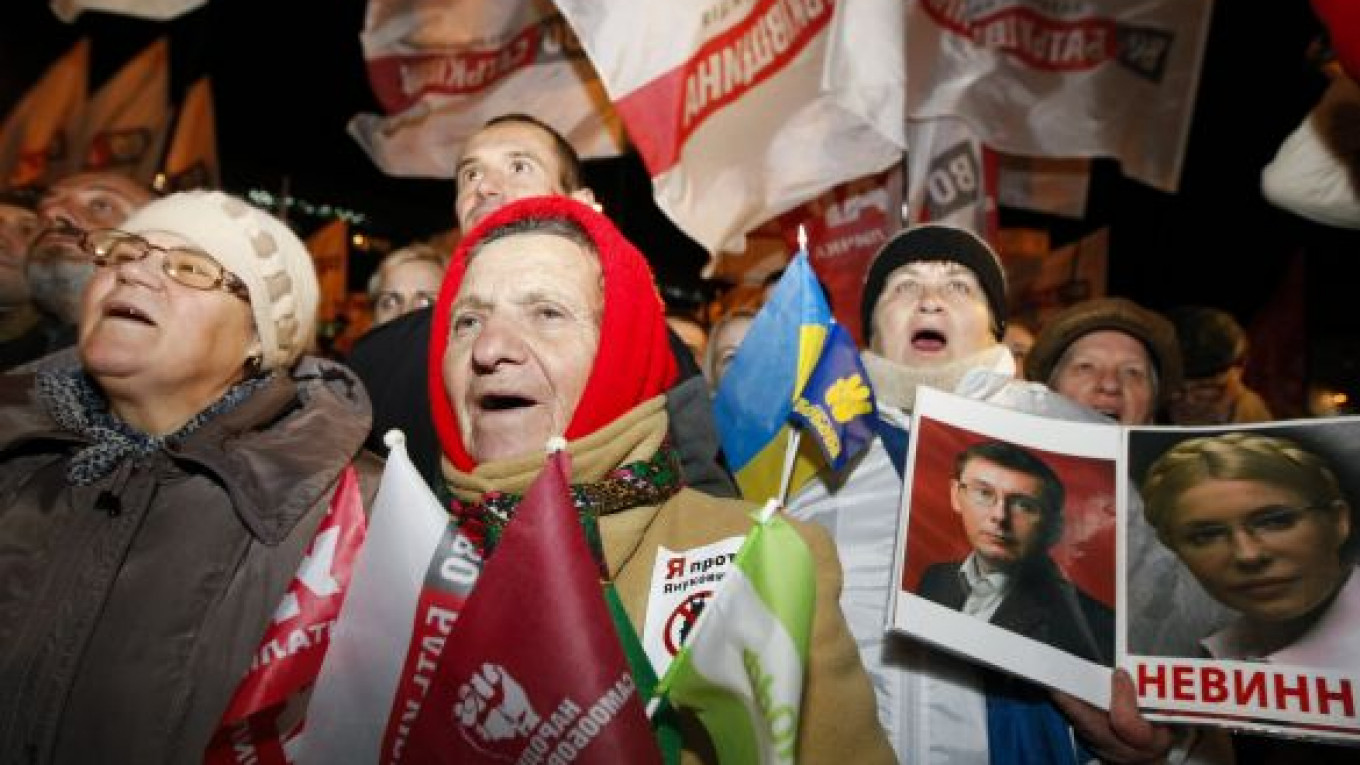Ukraine's ruling party has emerged from the fractious Oct. 28 election well short of a simple majority, but support from Communists and independents should ensure its grip on the new parliament, analysts said.
Opposition parties, which made a strong showing in an election criticized as flawed by international observers, said they would continue to regard voting in some electoral districts where they had lost as crooked.
Final figures from election authorities Sunday showed that President Viktor Yanukovych's Party of the Regions remained the biggest party in the 450-seat parliament, gaining an overall 185 seats.
Despite international criticism and street protests by the opposition, the election's outcome is likely to be used by Yanukovych as a springboard from which to launch a second bid for presidential office in 2015.
The pro-business Regions, which is financed by wealthy industrialists, says it alone can provide stability in Ukraine, a major exporter of steel and grain.
Its opponents say the jailing of his chief rival, ex-prime minister Yulia Tymoshenko, was designed to weaken political resistance during the election.
The opposition, which includes Tymoshenko's Batkivshchyna (Fatherland) party, far-right nationalists and a liberal party headed by boxing champion Vitaly Klitschko, says that his rule will extend corruption and cronyism and that relations with the West will deteriorate further.
Political tension has been sharpened by the impending resumption of a second trial of Tymoshenko, who is serving a seven-year sentence for abuse of office. The new trial, which is due to resume in Kharkiv on Tuesday, is for charges of tax evasion and embezzlement.
With the Communists, who normally vote with the Regions, having 32 seats, and independents, many of whom are funded by Regions' backers, holding 43, forces aligned with Yanukovych seemed certain of a parliamentary majority of more than 225 when the assembly reconvenes next month.
But the opposition has been reshaped. Batkivshchyna took 101 seats, Klitschko's UDAR (Punch) party got 40 and Svoboda (Freedom), a Ukrainian nationalist party, secured 37. Both UDAR and Svoboda will be newcomers to parliament.
"The Regions and the Communists will not have any problems putting together a majority in the new parliament because most of the independents will join them," said political analyst Mikhailo Pogrebinsky.
In response to opposition-rally participants' complaints of a crooked vote count, elections authorities have announced a revote in five individual electoral districts. But that does not suit some in the opposition coalition since it could endanger some of their candidates who won in the initial round.
Tymoshenko's party on Sunday defiantly announced it did not in any case accept the election commission's figures with respect to two constituencies that had been won by independents.
"We do not regard them as people's deputies but as criminals," a Batkivshchyna statement said. "We will do everything we can to stop these people from taking the oath, and we are convinced that a parliament formed in this way will not be legitimate."
Klitschko's UDAR party also kept up criticism of the election, saying in a statement that 1.5 percent of its votes had not been taken into account.
The three main opposition parties have yet to formulate a coordinated approach as to whether and under what circumstances they will take their places in the new parliament.
Related articles:
A Message from The Moscow Times:
Dear readers,
We are facing unprecedented challenges. Russia's Prosecutor General's Office has designated The Moscow Times as an "undesirable" organization, criminalizing our work and putting our staff at risk of prosecution. This follows our earlier unjust labeling as a "foreign agent."
These actions are direct attempts to silence independent journalism in Russia. The authorities claim our work "discredits the decisions of the Russian leadership." We see things differently: we strive to provide accurate, unbiased reporting on Russia.
We, the journalists of The Moscow Times, refuse to be silenced. But to continue our work, we need your help.
Your support, no matter how small, makes a world of difference. If you can, please support us monthly starting from just $2. It's quick to set up, and every contribution makes a significant impact.
By supporting The Moscow Times, you're defending open, independent journalism in the face of repression. Thank you for standing with us.
Remind me later.






